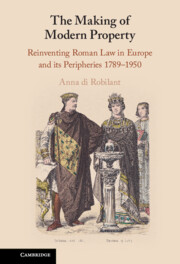Book contents
- The Making of Modern Property
- The Making of Modern Property
- Copyright page
- Dedication
- Contents
- Acknowledgments
- Introduction
- 1 What Roman Antiquity Had to Offer
- 2 The Foundations of Romanist-Bourgeois Property
- 3 Crafting Romanist-Bourgeois Property
- 4 Reform, Not Revolution
- 5 The Tensions of Absolute Property
- 6 Roman Dominium in the Republics of Latin America
- 7 The Social Critics
- Conclusions
- References
- Index
7 - The Social Critics
The Critique of Absolute Dominium and the Retrieval of the Roman Social Doctrines
Published online by Cambridge University Press: 13 July 2023
- The Making of Modern Property
- The Making of Modern Property
- Copyright page
- Dedication
- Contents
- Acknowledgments
- Introduction
- 1 What Roman Antiquity Had to Offer
- 2 The Foundations of Romanist-Bourgeois Property
- 3 Crafting Romanist-Bourgeois Property
- 4 Reform, Not Revolution
- 5 The Tensions of Absolute Property
- 6 Roman Dominium in the Republics of Latin America
- 7 The Social Critics
- Conclusions
- References
- Index
Summary
The aspirations to autonomy, independence, and equality that had so effectively boosted the discourse of modern dominium were never realized. The rationalization and expansion of the economy generated enormous wealth inequalities between the propertied classes and the large class of propertyless wage laborers. The latter experienced oppression rather than autonomy, material dependence rather than the independence, and exclusion instead of equality. The “social question” prompted social reformers of all stripes to interrogate the role of property law (in the emergent industrial world. The new political and intellectual climate ushered in by the “social question” transformed the ideological discourse about property, the concerns of the jurists, and, to an extent, the doctrines of law of property. Alternative conceptualizations of property focused on social relations, redistribution and cooperation, started appearing in the writings of philosophers, economists and pamphleteers. And a new generation of jurists, interested in functionalist and consequence-based approach to property, gained power in law faculties around Europe, Latin America and beyond.
Keywords
- Type
- Chapter
- Information
- The Making of Modern PropertyReinventing Roman Law in Europe and its Peripheries 1789–1950, pp. 280 - 321Publisher: Cambridge University PressPrint publication year: 2023



